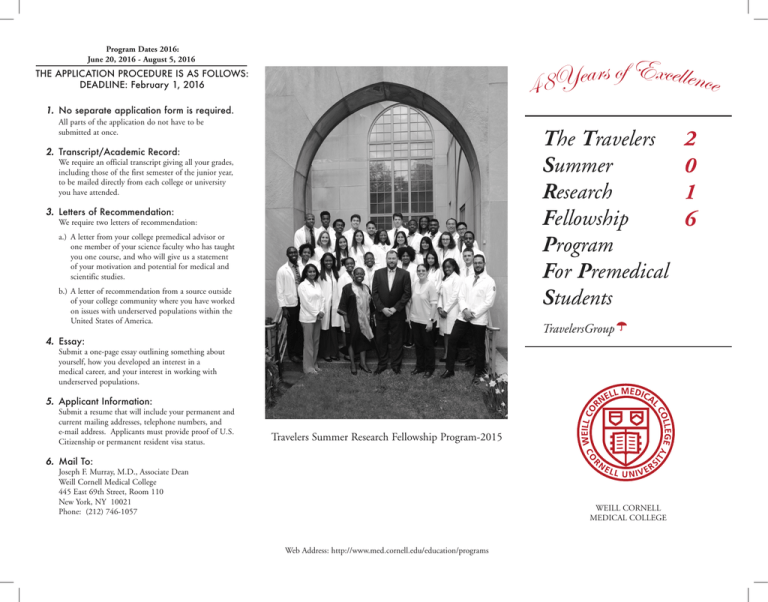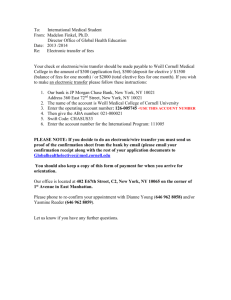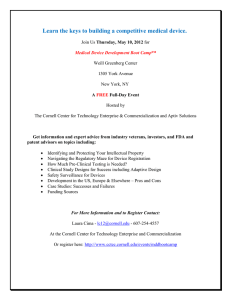4 8Y
advertisement

Program Dates 2016: June 20, 2016 - August 5, 2016 ars of Excellence e Y 8 4 THE APPLICATION PROCEDURE IS AS FOLLOWS: DEADLINE: February 1, 2016 1. No separate application form is required. All parts of the application do not have to be The Travelers Summer Research Fellowship Program For Premedical Students submitted at once. 2. Transcript/Academic Record: We require an official transcript giving all your grades, including those of the first semester of the junior year, to be mailed directly from each college or university you have attended. 3. Letters of Recommendation: We require two letters of recommendation: a.) A letter from your college premedical advisor or one member of your science faculty who has taught you one course, and who will give us a statement of your motivation and potential for medical and scientific studies. b.) A letter of recommendation from a source outside of your college community where you have worked on issues with underserved populations within the United States of America. TravelersGroup 4. Essay: Submit a one-page essay outlining something about yourself, how you developed an interest in a medical career, and your interest in working with underserved populations. 5. Applicant Information: Submit a resume that will include your permanent and current mailing addresses, telephone numbers, and e-mail address. Applicants must provide proof of U.S. Citizenship or permanent resident visa status. Travelers Summer Research Fellowship Program-2015 6. Mail To: Joseph F. Murray, M.D., Associate Dean Weill Cornell Medical College 445 East 69th Street, Room 110 New York, NY 10021 Phone: (212) 746-1057 WEILL CORNELL MEDICAL COLLEGE Web Address: http://www.med.cornell.edu/education/programs 2 0 1 6 It is our good fortune to have in the United States the best of medical facilities and constant state of the art research, providing ongoing advancement of knowledge and development of new treatment approaches. Yet, we face the challenge of addressing major gaps in research, health care, preventive measures, health policy, and bridging cultural barriers for a large segment of our population who are from traditionally underserved groups. The Institute of Medicine issued a report, Unequal Treatment: Confronting Racial and Ethnic Disparities in Healthcare, highlighting the severity of disparities in health care among racial and ethnic minorities. Among its specific recommendations is increasing the number of minorities represented in the health professions. Addressing these disparities is one of the highest priorities in U.S. medicine. Of critical importance in addressing such disparities is training a racially and ethnically diverse physician work force. Laurie H. Glimcher, M.D., the Stephen and Suzanne Weiss Dean of Weill Cornell Medical College and Provost for Medical Affairs, Cornell University states: "Our patient population has grown increasingly diverse. New York City, in particular, is one of the most racially, ethnically, and culturally diverse cities in the world. To best serve our patients, we must have a diverse workforce. Here at Weill Cornell, we have a unique opportunity to welcome students from a wide range of backgrounds to enrich our community of scholars, to study, and to become the physicians of the future." The presence of diversity among medical students becomes a critical mutual education process for all medical students, faculty, and administrators. Minority students become the physicians who we need to assist the field of medicine in addressing our major disparities in health care. Our Medical College and the Travelers Summer Research Fellowship has been and remains an essential part of that effort. Identifying potential medical students who have a major interest in the medical problems of the underserved is critical. Every effort must be made to include among our medical student body students who have had life experience with a range of issues affecting diverse groups, including minorities and the underserved, who have demonstrated direct interest in such issues via activity with various student organizations that target minority issues, and have the career ambition to address the problems of the medically underserved. The Travelers Summer Research Fellowship Program is designed to give 25 premedical students deeper insights into the field of medicine, including issues that greatly affect the health of traditionally underserved groups. Through the experiences of laboratory or clinical research, the student learns how one pursues a specific research problem under the supervision of a faculty member, thus providing an early education into basic research techniques that could be applicable to any area of medicine. A lecture series explores topics in cardiovascular physiology, exposing the students to basic science concepts that are relevant to a more specific understanding of hypertension and cardiovascular disease, both of which are major problems in minority communities. The summer fellows attend a series of talks by minority physicians about various medical specialties, addressing issues of concern in these physician's daily work plus views of the bigger picture in health care to minority communities. Rounds in the hospital with advanced year students provide further exposure to the clinical facets of medicine. Students in the summer program receive counseling on financial planning for medical school and how to examine the financial aid package. The Travelers Summer Research Fellowship Program is codirected by Elizabeth Wilson-Anstey, Assistant Dean of Student Affairs, and Dr. Joseph F. Murray, Associate Dean of Student Affairs and Equal Opportunity Programs. Since 1976, Dean Wilson-Anstey has helped develop and run the summer research program. Dr. Murray has been on faculty since 1999. Both are active members of the Admissions Committee. Students eligible for the program: • must be at least in their junior year of college • must be declared premed students who preferably have already taken biology, general chemistry, organic chemistry, and physics. Preference is given to students with a grade point average of B or above. • must have a demonstrated commitment to working on issues with underserved populations within the USA • must be from one or more of the following groups that are underrepresented in medicine - Individuals from racial and ethnic groups shown to be underrepresented in biomedical research: Blacks or African Americans, Hispanics or Latinos, American Indians or Alaska Natives, Native Hawaiians and other Pacific Islanders - Individuals from socioeconomically disadvantaged backgrounds - Individuals with disabilities (those with a physical ormental impairment that substantially limits one or more major life activities) • must be a U.S. Citizen or permanent resident. Last summer's fellows came from a wide range of institutions: • Azusa Pacific University • Brandeis University • City University of New York, Lehman College • Columbia University • Cornell University • Emory University • Howard University • Mount Holyoke College • Rutgers, The State University of New Jersey • Saint Michael's College • Southern Illinois University - Carbondale • Spelman College • Syracuse University • University of California, Santa Cruz • University of Guam • University of North Florida • University of Pennsylvania • University of Puerto Rico, Mayaguez • University of Wisconsin - Madison • Williams College Students receive a $140-a-week cost-of-living allowance and are housed rent-free in the dormitory for medical students, but are required to pay for their meals and other living expenses. Travel expenses are paid for students that live some distance from New York.

